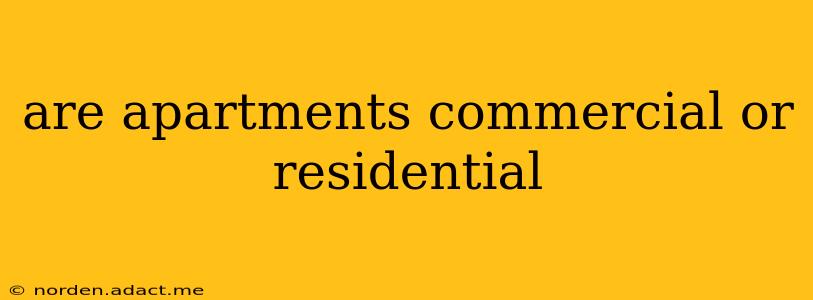Are Apartments Commercial or Residential? Understanding Property Classifications
The simple answer is: apartments are residential properties. However, the classification can get a bit more nuanced depending on the context. Let's delve deeper into the distinctions and explore some related questions.
What is the difference between commercial and residential properties?
This distinction hinges on the intended use of the property. Residential properties are designed for dwelling—places where people live. This includes single-family homes, townhouses, condominiums, and, yes, apartments. Commercial properties, on the other hand, are used for business purposes. This includes office buildings, retail spaces, restaurants, and hotels.
While an apartment building itself is considered residential, certain areas within an apartment complex might have commercial elements. For instance, a retail space on the ground floor of an apartment building would be classified as commercial, even though the majority of the building is residential.
Can apartments be used for commercial purposes?
Technically, no. Residential leases typically prohibit commercial activities within the apartment unit. Using a residential apartment for a business, like running a daycare or operating a home-based business without the necessary permits and landlord approval, is often a breach of contract and could lead to eviction. However, some apartment complexes may allow small-scale home-based businesses with appropriate permits and notification to the landlord. Always check your lease agreement and contact your landlord before starting any business operations from your apartment.
Are apartment buildings considered commercial real estate investments?
While the apartments themselves are residential, the building as a whole can be considered a commercial real estate investment. Investors purchase apartment buildings as a means of generating rental income, making it a commercial venture from the perspective of the investor. This is different from the classification of the units themselves, which remain residential.
What are some examples of mixed-use buildings?
Mixed-use buildings combine residential and commercial spaces within the same structure. These are becoming increasingly common in urban areas. You might find retail stores, restaurants, or offices on the ground floor, with residential units occupying the upper floors. While the building is a mixed-use property, the individual units are still classified as either residential or commercial based on their function.
How are property taxes determined for apartments?
Property tax assessments are often based on the classification of the property. Residential properties typically have lower tax rates than commercial properties. However, the specific tax rate for an apartment building can vary depending on factors like location, the value of the property, and local tax laws. These taxes apply to the building as a whole, not the individual apartments.
In conclusion, while the individual units within an apartment building are undeniably residential, the larger context—the building itself, its investment potential, and its possible inclusion of commercial spaces—can blur the lines somewhat. Understanding these nuances is crucial for anyone involved in the real estate market, whether as an investor, landlord, tenant, or homeowner.
